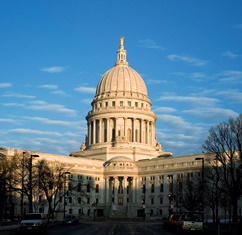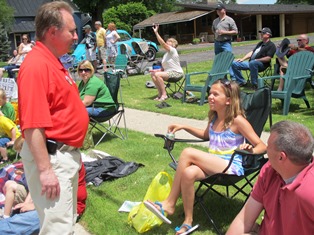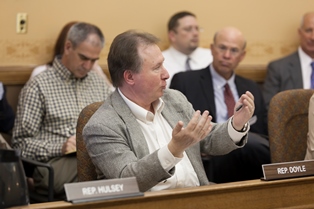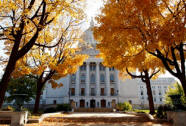|

Dear Neighbors,
Well summer is officially here! School is ending and the temperature is
going up. Over at the Doyle Alpaca Ranch, it is shearing time for the
alpacas and all across the state agriculture is booming. And just in
time too. It's Dairy Month here in Wisconsin. Check out the article
below for more information about the festivities and visit my "In the
District" section to see the schedule of dairy-themed events in our
area.
With the budget process hopefully coming to a close this month and the
Legislature going into summer recess, I'll be able to come travel around
the district to meet and talk with all of you. I'll be knocking on doors
and delivering newsletters from Bangor to Holland to Rockland and
bringing news from the Capitol right to your doorstep. It is so
important for me to know the thoughts and opinions of my constituents so
I look forward to getting to discuss the events of the last few months
with many of you.
I continue to be proud to
represent you and I remain committed to finding solutions that best
serve you, my constituents, and the people of Wisconsin. Thank you for
the privilege to serve as your State Representative.
Sincerely,

STEVE DOYLE
State Representative
94th Assembly
District
June Dairy Days!
It's time to celebrate our farming heritage.

The Dairy Days of Summer have arrived here in Wisconsin.
Did you know that Wisconsin has nearly 11,000 dairy farms? That is more
than any other state in the country, including our dairy producing
rival, California. Last year, our dairy cows produced 27.2 billion
pounds of milk, setting a new record.
About 90% of the milk produced in Wisconsin is used to make cheese. We
have nearly 1,200 licensed cheesemakers and they produce 600 types,
varieties and styles of cheese. Wisconsin has also made a name for
ourselves as one of the nation's top producers of specialty cheeses, like Blue,
Gouda and Feta.

Not only do Wisconsinites produce lots and lots of cheese, we also
produce award winning cheese. Recently, at the 2013 U.S. Championship
Cheese Contest, our state took home gold medals in over half of the 81
judging categories. Again, this was more than any other state in the
nation.
Our Wisconsin economy is built on the hard work of our dairy farmers.
$26.5 billion of the state's economy comes from the dairy industry and
this helps to strengthen our local communities. When you think of other
states and their principal agriculture exports, like Idaho potatoes or
Florida oranges, it is incredible to realize that our dairy makes a
greater impact than both of these combined.
To celebrate our dairy farms and their incredible impact on our state, I
attended the West Salem June Dairy Days breakfast and the June Dairy
Days parade. Here are some photos from the parade:

Senator Jennifer Shilling and I got to talk with
constituents from our districts.

Talking with some of my youngest constituents is always
fun. Especially when I get to see students who came to visit the Capitol
and who I got to see when I visited their schools with photo postcards.
P.S. they all remembered how many light bulbs are in the Capitol.

My daughter Stephie and our dog Leah certainly enjoyed
themselves!
June Dairy Month
is a great time to take the whole family out and experience this
important and special part of our Wisconsin culture. The strength of the
dairy industry is a testament to our great dairy history and to our
commitment to the future.
For more information about all the dairy-related happenings going on
this month, visit the Wisconsin Milk Marketing Board's website at
www.dairydaysofsummer.com.
***
Photos From the Office
This month has been quite a busy one for me. Check out these photos:

His Holiness the 14th Dalai Lama addresses a joint session of the
Legislature on May 14th.

I had the opportunity to visit Viking Elementary and chat with some 4th
graders who had a lot of questions about state government.

The Tourism Committee held a public hearing last month to hear from
citizens around the state.
***
Rehired Teachers
Are An Asset for Our Community
New proposal hurts local schools

We all know that double
dipping your food is bad. Kids are told by their parents not to double
dip their chips in the salsa and then there is the classic Seinfeld
episode. But right now, the Wisconsin Legislature is not discussing the
merits of whether or not a carrot can be dipped in ranch dressing more
than once. We are talking about a different kind of issue: retired
public employees like teachers who return to the classroom and help save
school districts money.
Here in Wisconsin, all
retired state employees receive an annuity. These are their retirement
benefits administered by the Wisconsin Retirement System (WRS). After a
30 day break-in-service requirement, these retirees are allowed to
return to public employment. At this point they are given a choice, give
up their retirement until they retire again or continue to receive their
annuity and work without benefits. For a lot of people, the latter is a
very appealing option.
This ability to rehire a retired employee without having to provide
benefits has been beneficial for our school districts, especially the
rural ones. Unfortunately because of last year’s budget cuts, districts
are struggling to find qualified employees who are willing to work for
less. If a teacher from a larger district in Milwaukee retires to the La
Crosse area and then decides to go back to work, our districts can hire
them as a part-time replacement without having to worry about providing
health insurance, vacation or sick time. We get to reap the benefits of
their years of experience without bankrupting our district.
When it comes to finding
teachers for math and sciences, Guy Leavitt, the CESA #4 Administrator,
told me that it is often very hard to find qualified people when the
district is only able to afford a half-time position. This drives many
young teachers still struggling with their college debt to seek out
higher paying jobs. A retired teacher who does not have to worry about
that debt could be a real lifesaver in one of these situations.
This rehiring also helps
school districts hire itinerant staff, specialized part-time instructors
that serve multiple schools. Requiring a teacher to travel across a
school district or even a CESA district while only paying them half-time
limits the number of applicants for these positions. Recent retirees can
help fill these jobs so that children who need a little extra help get
the quality care they deserve.
These retirees are helping
our school districts get by in very difficult situations. Without them
as a resource that school boards can turn to in a crisis, Mr. Leavitt
warned things could go from bad to worse.
Now back to the budget. In
his proposal, the Governor recommended that the break-in-service
requirement be expanded to 75 days instead of 30. The proposal also
requires that you lose your pension if you go back to work as a public
employee where you are expected to work at least two-thirds (1,392
hours) of what the ETF (Department of Employee Trust Funds) considers to
be full-time.
If the budget bill is signed
into law with these new requirements for hiring annuitants, we are
putting our school districts in a difficult position. If rehired
teachers are forced to choose between working part-time or collecting
benefits, our schools will lose out on yet another group of qualified
employees who simply cannot afford to live off of the available salary.
This requirement on rehiring
state retirees is a one-size fits all solution that does not take into
account the variety of situations and circumstances that brings a public
employee back to work. This issue is broader than rehiring a retired
teacher; this is about small towns that cannot afford to hire police
chiefs and fire chiefs and rely on retirees to help them protect their
citizens. This is about Universities like UW L balancing their budget by
hiring part-time employees. I agree with those who say we should work to
prevent fraud to ensure that our hard working public employees’
retirement funds remain solvent, but limiting the options available to
our schools and small towns is not the way. Double-dipping is bad with
chips, but when it comes to hiring educators for our children, an
experienced and qualified teacher may be just the inspiration they need
to thrive.
***
|

















